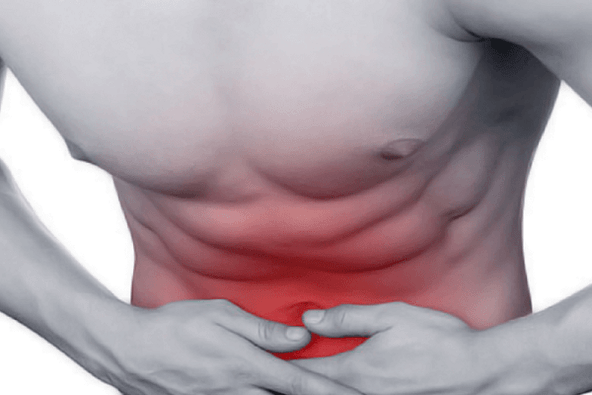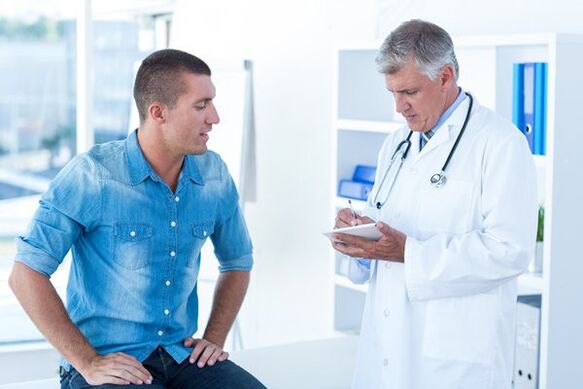
Chronic prostatitis - the scourge of modern men or a disease they'd rather not notice?
According to statistics, this is the most common disease of the male reproductive system, occurring equally in young and old men.
The insidiousness of chronic prostatitis is that in most cases the disease is almost asymptomatic.
A little anatomy. . .
The prostate is a male gland with a volume of 20 to 30 ml, which acts as a barrier against the penetration of infections into the organs of the genitourinary system, due to the production of antibacterial substances. A kind of small valve that prevents sperm from entering the bladder and also produces a fluid that ensures high sperm motility.
Definition of prostatitis
Inflammation of the gland is nothing more than prostatitis. It increases in size, over time, due to the constant inflammation, scar tissue forms. What can cause inflammation, consider below, now another question. . .
How to know what is sick?
Each organism is unique and the signs of disease manifestation can be different, but long-term observations of patients with chronic prostatitis have allowed doctors to identify the most common symptoms: pain in the groin, immediately after ejaculation; urination, accompanied by pain, heaviness in the lower abdomen, orgasm is not expressed, erased.
Why is this happening?
The prostate is inflamed and any contraction causes discomfort. This whole picture is complemented by: rapid fatigue, sleep disturbances and, as a result, irritability.
Because I have?
Causes…
Analyze your life, perhaps it was, or is the following:
- Sexually transmitted infections: chlamydia, trichomoniasis. Or pathogens: staphylococcus aureus, E. coli.
- Perhaps you are an office worker and lead a sedentary lifestyle.
- Or your life is a constant stress.
- Irregular sex life, or its complete absence (leads to stagnant processes in the prostate).
- Acute chronic diseases that reduce immunity.
- Power errors. Many experts agree that malnutrition is also an indirect cause of chronic prostatitis.
- Bad habits: alcohol and smoking.

What to do?
If you experience any of the above symptoms, be sure to consult a doctor. In no case do not self-medicate, following the magic tips described on the Internet.
Important!
Before choosing a urologist, look at the reviews of the people he's helped, not his perks. Read the advice of those being treated in the forums regarding a particular clinic.
Chronic prostatitis treatment
First, the doctor takes your medical history. It is very important here, without hiding the details, to describe what happened to you when the first symptoms of the disease appeared.
Also, in order to make a correct diagnosis and determine your type of prostate disease, the doctor will prescribe a comprehensive examination.
There are four types of prostatitis:
- Bacterial - very rare, possibly acutely undertreated.
- Abacterial inflammatory with an infectious pathogen.
- Abacterial without inflammation.
- Asymptomatic - no symptoms.
The doctor will prescribe a complete examination. This includes blood and urine tests, several smears, a palpable exam by a doctor to determine the size of the prostate, an ultrasound exam.

Based on the characteristics of your body and the results of the research, the doctor will prescribe an effective treatment for chronic prostatitis.
The road is long and here it is important to understand that success in treatment does not depend only on medication and prescribed procedures. Success largely depends on your lifestyle.
Are you ready to change your life? Regularly exercise, running, walking for aged men. Make sure you sleep. Healthy food. Avoid cigarettes and alcohol.
Modern technologies for the treatment of chronic prostatitis
In the backyard of the 21st century and medicine does not stand still. There are new drugs as well as new painless hardware treatment methods that have shown themselves well in clinical trials.
From hardware treatment, laser therapy is now widespread. Acting directly on the inflamed tissue, the laser restores blood circulation, gradually removing scar tissue.
Side effects are practically not found, but there are a number of contraindications, such as: heart disease, epilepsy, diabetes and a few more.
Treatment with transurethral waves also proved to be good. The bipolar source directs heat energy to the affected area, allowing selective heating and destruction of only the rapidly growing glandular cells, while the surrounding tissues are not damaged.
The goal of treatment is to reduce inflammation and eliminate infection from the prostate.
Pros: Painless, no anesthesia, single procedure. No side effects were observed.
Another painless treatment for chronic prostatitis is ultrasound. It gives positive dynamics in the work of the gland, reduces scar tissue, promotes tissue regeneration.
But, we must remember: to obtain a good effect in the treatment, it is necessary to alternate medication and treatment with hardware. Positive dynamics are also observed with alternating various hardware courses for the treatment of prostatitis.
Panacea or deception?
Now, the Internet has many miracle drugs and miracle devices for the treatment of chronic prostatitis.
Do not trust advertising, and even more so on self-medication.

At best, this will end in loss of money for you, at worst, it will delay your recovery or even make it impossible.
Is it possible to fully recover?
There is no clear answer here. . .
Some of the doctors promise a complete cure, others say that it is only possible to improve the quality of life.
It's all up to you, at the first signs you notice - don't pull, go through the study.
Even if nothing bothers you, doctors recommend a thorough exam once a year.

If the diagnosis is made, remember - this is not a sentence. And a positive outcome in treatment is possible if you want it anyway, following the doctor's prescriptions and leading the correct lifestyle.





























